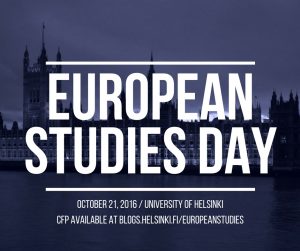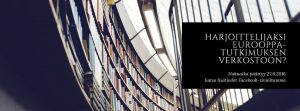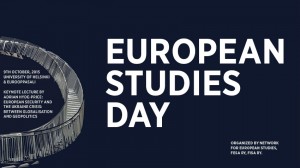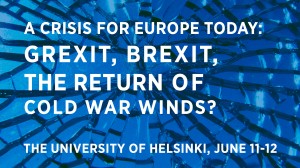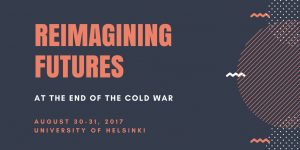
Reimagining Futures at the End of the Cold War
Programme
Wednesday August 30
University of Helsinki Main Building, Auditorium XIV Fabianinkatu 33
09.30 Coffee and tea
10.00-11.00 Keynote session
Opening words, Professor Kimmo Rentola, University of Helsinki
Keynote lecture, Professor Jussi Hanhimäki, Graduate Institute of International and Development Studies, Geneva: Unexpected Transformations? The End of the Cold War in History and Historiography.
11.00-12.00 Paper session I Finnish Foreign Policy and Changing International Orders
Chair: Research Director Juhana Aunesluoma, University of Helsinki
Professor Tuomas Forsberg, University of Tampere: ‘We did not believe in change because we did not want it’. Confirmation bias, Finnish foreign policy and the end of the Cold War.
Professor Kari Möttölä, University of Helsinki: Two lessons in managing change: Finnish foreign policy at the onset and breakdown of the post-cold war order.
PhD candidate Juha-Matti Ritvanen, University of Turku The Soviet Union, Great Britain and Finland’s Operation Pax 1989–1990
12.00-13.00 Buffet Lunch, University of Helsinki Main Building
13.00-14.30 Paper session II Finnish Perspectives
Chair: Senior Lecturer Johanna Rainio-Niemi, University of Turku
Professor Louis Clerc, University of Turku: From KANTINE to Nation-Branding: Finland’s image policy from the Cold War to a Globalized Economy
PhD candidate Saara Matala, Aalto University, Beyond the Business as Usual: Finnish-Soviet scientific and technological cooperation in Arctic Maritime technology 1976-1990
Aino Hakovirta: The Doctrine of Finnish Foreign Policy in the Late Cold War and Beyond: The Operational Code of Kalevi Sorsa
PhD candidate Tapio Juntunen, University of Tampere: The Cold War ended, nuclear weapons remained: Finnish perceptions of the START-treaty and the Soviet Union’s nuclear successor question in 1991-92.
14.30–14.45 Coffee and tea
14.45–16.15 Paper session III The Cold War’s End and the Baltic Sea Region
Chair: Research Director Juhana Aunesluoma, University of Helsinki
Lecturer Mart Kuldkepp, University College London: Imagined futures in the Swedish diplomatic reporting from the Baltics in 1989-1991
Dr Kaarel Piirimae, Tartu: The New Thinking in Soviet Foreign Policy and the Constituent Republics: the example of Estonia and Latvia
Researcher Mikkel Runge Olesen, Danish Institute for International Studies: The birth of Danish foreign policy activism: Supporting Baltic independence 1990-91
Independent researcher, Lars Grønbjerg: Ideas behind the creation of interstate cooperation in the Baltic Sea region 1987-1992 with special focus on the Council of the Baltic Sea States.
16.15–17.30 Paper Session IV European Perspectives
Chair: Kimmo Rentola
Senior Lecturer Kimmo Elo, University of Helsinki: East German Foreign Intelligence, the Baltic Sea Region and the End of the Cold War 1985-89
Senior Lecturer Johanna Rainio-Niemi, University of Turku: Cold War Neutrality in Europe: Lessons to be learned?
Post-doctoral research fellow Suvi Kansikas, University of Helsinki: From the Soviet Union to the European Union.
Thursday August 31
University of Helsinki Main Building, Auditorium XIV (Fabianinkatu 33)
9.00 Coffee and tea
9.30-11.30 Contemporary eye-witnesses – Note: The language of the session is Finnish
Puheenjohtaja ja avauspuheenvuoro, Juhana Aunesluoma
Aloituspuheenvuoro, professori Tuomas Forsberg, Tampereen yliopisto: ‘We did not believe in change because we did not want it’. Confirmation bias, Finnish foreign policy and the end of the Cold War. (esitys suomeksi)
Paneelin osallistujat: Jaakko Kalela, Jaakko Blomberg, Jaakko Laajava, René Nyberg
End of the conference.
Notes:
Please register your attendance with conference assistant Vica Protovin by 22 August at vica.protovin@helsinki.fi
All registered participants are invited to a buffet lunch on Wednesday, August 30. Coffee and tea will be served during the conference.
Paper presenters, panelists and chairs are invited to a conference dinner on Wednesday August 30, at 19.00 and to a lunch on Thursday August 31, 12 noon. Locations will be announced later.



